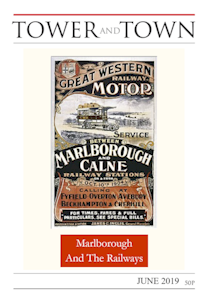

Tower and Town, June 2019 (view the full edition) (view the full edition)Alexandra Terrace (part I of a memoir)I was born 25th. January 1938, in the front bedroom of No. 7, Alexandra Terrace, Marlborough, the first child of William George Pearce and Frances Olive Pearce (nee Newman), attended by the District Nurse and midwife, Nurse Lush. Alexandra Terrace was a short block of 12 terraced three-bedroom houses built in about 1907, off Blowhorn Street. The houses originally had been built for local shop-owners, clergy and generally lower middle-class people, all being individually privately owned. My parents, who had married at Lydiard Millicent in 1935, had previously lived at 'Sunny Croft', Coldharbour Lane but turned down the chance to buy it on the (poor) advice of my maternal grandfather. We moved to Alexandra Terrace in 1937, the 'new' house having no electricity (installed 1954), all lighting and heating being by gas, candles, coal fire and a gas stove. In the kitchen was a cast iron range and a large brick built copper, fitted with a semi-rotary hand pump to pump hot water to the upstairs bathroom, but we could never make it work, so our infrequent baths in the bathroom were taken by carrying hot water upstairs in saucepans: very dangerous. Otherwise, it was a galvanised wash tub in the kitchen. Our neighbours at that time were Brangwyns, family bakers, at No. 6 (Mrs. Brangwyn was the sister of Norman Lumsden, who played the part of J.R. Hartley in the Yellow Pages T.V. advert, who often came to stay). Our neighbours at No. 8 were the Hilstons, at No. 9 the Winchcombes. No. 1 was the Leneys, Mr. Leney being an H.G.V. driver working for, I believe, Carter-Paterson operating out of London. In No. 2 lived the Whiteside family, staunch Exclusive Brethren as were the Sims at No. 10. My father, Bill, at that time worked at Hurd's shoe shop in the High Street. He was a very keen amateur golfer playing with a very low single figure handicap. The clubhouse was in a small compound next to the current cemetery off the Rockley Road and known as the Thistle Club for 'artisans'. The club also had a shed behind The Clump which housed a Ford Model T car fitted with spiked wheels, used for towing mowers. All this began to change in September 1939 when war on Germany was declared. Mr. (Walt) Hilston became an Air Raid Warden and Mr.(Bill) Winchcombe became a Clerk of Works on the construction of the camp at Ogbourne St. George. My father stayed on at Hurds until he was called up in 1940 as he was not in a Reserved Occupation. Off he went to join the Royal Artillery, Bofors guns, leaving my mother and myself alone in our large three bedroomed house, and couldn't return for about eighteen months as he was posted all around the U.K. With the East End of London being blitzed, an influx of evacuees came to Marlborough with little in the way of possessions. We usually had two families billeted with us. My mother and I had one bedroom, a sitting room and kitchen, but the kitchen was shared by the other families. A gas stove was installed in our front living room and the upstairs bathroom and toilet were shared by all. The families changed from time to time as circumstances changed, some were very pleasant people, others were not, but we could now understand how everyone was under a great deal of stress. One particular family stole all of my Christening silverware presents, but another family from Austria, the Einows, were very pleasant appreciative as, being Jewish, they had escaped from Hitler. They were father, mother, two children and a granny and spoke little English. This was when I heard of our first casualty: Percy Howell's (my age) father who lived near us had been killed. The Brangwyns moved on and No.5 was occupied by Mrs Strickland and her son Brian, refugees from Catford, London. Mr Strickland worked for Thomas Cook, in London, and on the outbreak of war was recruited into the Army as a Major due to specialist knowledge, spending most of his time in Cairo. Very pleasant people, but with a much greater income than ours. Their only child, Brian, went to Mayfield College, a private school in London Road. Mrs Strickland told us that the singer Anne Shelton was a teacher at their local school in Catford. The next major impact of war was rationing. Each person was allowed minuscule quantities of such items as sugar, butter, margarine, meat, sweets and clothing. Surprisingly bread was not rationed at that time. My paternal grandparents lived at No. 13 Chiminage Close further up Blowhorn Street towards The Common. Two of my maiden aunts, Annie and Lily, lived with my grandparents. Their bigger numbers meant they had larger rations than us, of course, and to economise, my aunts always mixed their butter and margarine rations together. One day I was with my mother in New Road outside the yard where Coopers the Butchers slaughtered their animal. A large black dog owned by the Anglis family leapt the wall from the yard with a large carthorse hoof in its mouth; no doubt that poor horse had filled many families' rations. With food rationing in place the Government organized a restaurant chain called The British Restaurant, located on The Green in front of the Toc H Hall, where two flat areas remain where the restaurant had been. Meals could be purchased at these restaurants without the need for ration books or coupons. My mother was directed to work there which was quite useful as we had meals there which enabled us to save our rations. Gareth Pearce |